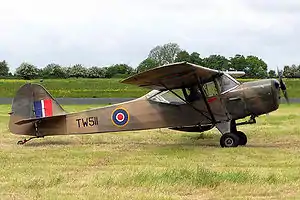| No. 662 Squadron RAF | |
|---|---|
 662 Squadron Taylorcraft Auster in Belgium, World War II | |
| Active | 30 Sep 1943 – 15 Dec 1945 1 Feb 1949 – 10 Mar 1957 |
| Country | |
| Branch | |
| Role | Air observation post squadron |
| Motto(s) | Greek: Olethrion Omma ("Death dealing eye") |
| Insignia | |
| Squadron Badge | In front of two shells in saltire, an eagle's head erased[1] |
| Squadron Codes | ET (Sep 1944 – Dec 1945)[2][3] ROB (Feb 1949 – Apr 1951)[4][5] |
| Aircraft flown | |
| Reconnaissance | Auster Single-engined Army liaison monoplane |
No. 662 Squadron was a Royal Air Force air observation post squadron associated with the 21st Army Group and later part of the Royal Auxiliary Air Force. Numbers 651 to 663 Squadrons of the RAF were air observation post units working closely with Army units in artillery spotting and liaison. A further three of these squadrons, 664–666, were manned with Canadian personnel. Their duties and squadron numbers were transferred to the Army with the formation of the Army Air Corps on 1 September 1957.[6][7] It is now an Apache Helicopter Squadron.
History
Formation and early years
No. 662 Squadron was formed at RAF Old Sarum on 30 September 1943 with the Auster III which gave way to the Auster IV in March 1944. The squadron role was to support the British 21st Army Group in June 1944 when it moved to France. It briefly flew from Nordhorn in Germany from 7 to 10 April 1945.[8] The squadron supported the Army until the end of the war when it was disbanded on 15 December 1945 at Melsbroek in Belgium.[9]
Post war
After the war the Air Observation Squadrons were reformed and No. 662 Squadron Royal Auxiliary Air Force was reformed as such at RAF Colerne on 1 May 1949, also operating a flight from RAF Middle Wallop, to provide support to the Army in the West Country until it was disbanded at RAF Colerne on 10 March 1957.[9]
No. 1956 Air Observation Post Flight was formed within 662 Squadron along with No. 1962 Air Observation Post Flight and No. 1963 Air Observation Post Flight.[10]
Aircraft operated

| From | To | Aircraft | Variant |
|---|---|---|---|
| September 1943 | April 1944 | Auster | Mk.III |
| March 1944 | December 1945 | Auster | Mk.IV |
| September 1944 | December 1945 | Auster | Mk.V |
| February 1949 | October 1951 | Auster | AOP.5 |
| February 1949 | February 1957 | Auster | AOP.6 |
| October 1949 | January 1950 | Auster | AOP.4 |
See also
References
Notes
- 1 2 Halley 1988, p. 449.
- ↑ Bowyer & Rawlings 1979, p. 37.
- ↑ Flintham & Thomas 2003, p. 71.
- ↑ Bowyer & Rawlings 1979, p. 138.
- ↑ Flintham & Thomas 2003, p. 187.
- ↑ Halley 1988, pp. 444–451.
- ↑ Jefford 2001, pp. 102–104.
- ↑ "Stations-N".
- 1 2 3 Jefford 2001, p. 104.
- ↑ Lake 1999, p. 101.
Bibliography
- Bowyer, Michael J.F.; Rawlings, John D.R. (1979). Squadron Codes, 1937–56. Cambridge, UK: Patrick Stephens Ltd. ISBN 0-85059-364-6.
- Flintham, Vic; Thomas, Andrew (2003). Combat Codes: A Full Explanation and Listing of British, Commonwealth and Allied Air Force Unit Codes since 1938. Shrewsbury, Shropshire, UK: Airlife Publishing Ltd. ISBN 1-84037-281-8.
- Halley, James J. (1988). The Squadrons of the Royal Air Force & Commonwealth, 1918–1988. Tonbridge, Kent, UK: Air-Britain (Historians) Ltd. ISBN 0-85130-164-9.
- Jefford, C.G. (2001). RAF Squadrons, a Comprehensive record of the Movement and Equipment of all RAF Squadrons and their Antecedents since 1912 (2nd ed.). Shrewsbury, Shropshire, UK: Airlife Publishing Ltd. ISBN 1-85310-053-6.
- Lake, Alan (1999). Flying units of the RAF. Shrewsbury: Airlife. ISBN 1-84037-086-6.
- The Illustrated Encyclopedia of Aircraft (Part Work 1982–1985). Orbis Publishing.